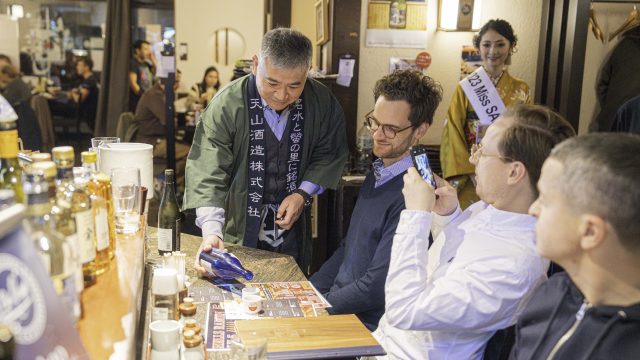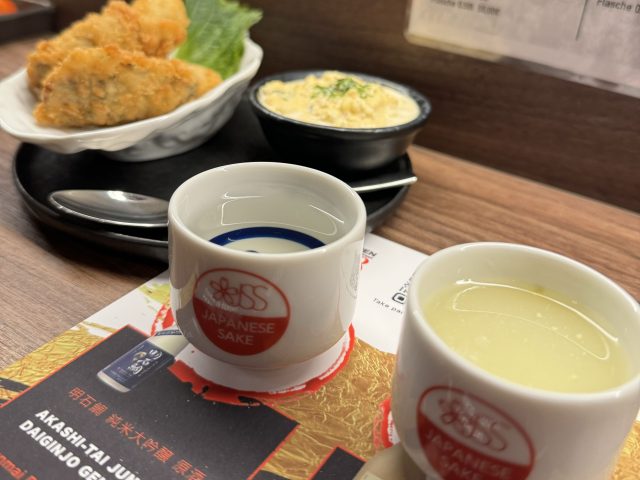Este sitio web utiliza cookies para que podamos ofrecerle la mejor experiencia de usuario posible. La información de las cookies se almacena en su navegador y realiza funciones como reconocerle cuando vuelve a nuestro sitio web y ayudar a nuestro equipo a comprender qué secciones del sitio web le resultan más interesantes y útiles.
Los lugareños conocen el sake en los eventos "ProWein goes city"
La Asociación Japonesa de Fabricantes de Sake y Shochu se aventuró más allá de Messe Düsseldorf con eventos para consumidores bajo el lema "Prowein goes city".

La Asociación Japonesa de Fabricantes de Sake y Shochu asistió a la ProWein en Düsseldorf a principios de marzo, basándose en una serie de visitas a la feria que se remontan a 2018. La delegación, compuesta por 18 cervecerías de sake y dos destilerías de honkaku shochu, participó en una serie de degustaciones y eventos en el transcurso de los tres días de feria. Sin embargo, también llevaron sake a 'ProWein Goes City', una selección de eventos fuera del horario comercial destinados tanto a los visitantes de la feria como a los consumidores locales.
Düsseldorf es un lugar ideal para el proyecto, ya que es una ciudad notablemente cosmopolita. Es el hogar de alrededor de 6.000 residentes japoneses y 200 empresas japonesas. Por lo tanto, existe una sinergia natural con el sake y un gran potencial en su mercado local.
Los eventos involucraron directamente a 12 de las cervecerías visitantes y se enfocaron en tres modos de consumo separados. Durante dos días, los exclusivos restaurantes japoneses de la ciudad sirvieron menús exclusivos combinados con sake de alta calidad. En un grupo de establecimientos más informales, los sakes se combinaron con bocadillos exclusivos en el transcurso de siete días. Como elemento final, se realizaron degustaciones y promociones en un supermercado de alta gama.
Los productores tuvieron un éxito particular en los establecimientos de comida informal. Estos cinco locales, repartidos por el barrio japonés de la Immermanstrasse, servían cada uno un menú fijo con dos sakes diferentes y aperitivos de autor.
Para añadir un incentivo a la actividad, estos menús se trataron como un rally de sellos. Se alentó a los consumidores, especialmente a los bebedores más jóvenes que pueden no conocer el sake, a recolectar estampillas en múltiples lugares participantes. Al recibir tres sellos, ganaron una taza de sake tradicional de cortesía.

La serie se hizo aún más especial por la asistencia de los productores de sake y Miss Sake Japan en la primera noche. Estuvieron disponibles para hablar con los clientes, recomendar menús y servir sake, todo lo cual ayudó a aumentar las ventas. Algunos clientes incluso compraron más sake después de su menú fijo.
La JSS cree que los eventos fueron una forma ideal de promover el sake en la escena gastronómica de Alemania y en Europa en general. Considera que los eventos de maridaje son un trampolín para demostrar que el sake es compatible con una variedad de cocinas.
En particular, la JSS entiende que poner una variedad de sakes, incluidos Junmai Ginjo, Nigori (sakes turbios) y licores de sake, frente a los clientes es clave para disipar conceptos erróneos. Permitir que los consumidores los prueben demuestra que el sake no es una bebida altamente alcohólica e inaccesible, y demuestra que hay un estilo para cualquier ocasión. Al presentarlo en estos ambientes informales, la JSS está segura de que el sake se adoptará en cada vez más escenarios gastronómicos.

